Our goal is to provide early funding for basic scientists and clinicians to test innovative ideas for improving diagnosis and developing new treatment modalities for pancreatic cancer. Our Seed Grant program continues to promote the expansion of pancreatic cancer programs within the scientific community and to establish collaborations within the field for mutual projects that can be considered for further funding.
We congratulate the following awardees.
2024 Seed Grant Recipients
 Katelyn T. Byrne, PhD
Katelyn T. Byrne, PhDOregon Health & Science University
Aim: Treatment / Therapy
Interrogating the role of the PSGL1/VISTA axis in the pancreatic tumor-immune microenvironment
 Julienne L. Carstens, PhD
Julienne L. Carstens, PhDThe University of Alabama at Birmingham
Aim: Cancer Biology
Defining the cancer cell regulators of immunity enabling pancreatic cancer liver metastasis
 Alicia K. Fleming Martinez, PhD
Alicia K. Fleming Martinez, PhD Mayo Clinic
Aim: Early Diagnosis & Detection
Leveraging Metabolic Changes in PanIN Lesions for Early Detection of Pancreatic Cancer
 Mark Girgis, MD
Mark Girgis, MDUniversity of California, Los Angeles
Aim: Early Diagnosis / Detection
Molecular Testing of Pancreatic Cystic Neoplasms: Enhancing the Malignant Yield of Pancreatectomy
 Conan Kinsey, MD, PhD
Conan Kinsey, MD, PhDHuntsman Cancer Institute at the University of Utah
Aim: Prevention / Metabolism
Preventing Pancreatic Cancer Through RAS Inhibition
 Jacques Lux, PhD
Jacques Lux, PhDUT Southwestern Medical Center
Aim: Treatment / Therapy
Ultrasound-guided STING activation with Spatial and Temporal Precision to Improve Pancreatic Cancer Response to Immunotherapy
 Jimin Min, PhD
Jimin Min, PhDUT MD Anderson Cancer Center
Aim: Cancer Biology
Spatial omics profiling to assess the impact of aging on the normal and neoplastic pancreas
 Somnath Pandey, PhD
Somnath Pandey, PhDUniversity of Miami
Aim: Treatment / Therapy
Genetic deletion of MALL reprograms tumor microenvironment and improves survival response to anti-PD1 in pancreatic-ductal adenocarcinoma
 Fredrik Ivar Thege, Ph.D.
Fredrik Ivar Thege, Ph.D.UT MD Anderson Cancer Center
Aim: Treatment / Therapy
Identifying synergistic combinations to improve KRAS-targeted therapy response in PDAC
 Liying Zhang, MD, PhD
Liying Zhang, MD, PhDUniversity of California, Los Angeles
Aim: Treatment / Therapy
Identifying circulating biomarkers for predicting response to neoadjuvant immunotherapy in pancreatic cancer
2023 Recipients
2023 Collaborative Seed Grants
 Slavica Tudzarova-Trajkovska, PhD
Slavica Tudzarova-Trajkovska, PhD Associate Professor
Department of Medicine, Endocrinology
University of California, Los Angeles
Los Angeles, CA
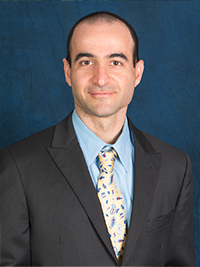 Neema Jamshidi, MD, PhD
Neema Jamshidi, MD, PhDAssociate Professor
Department of Radiological Sciences
University of California, Los Angeles
Los Angeles, CA
 Michael DeLong, MD
Michael DeLong, MDAssociate Professor
Department of Surgery
University of California, Los Angeles
Los Angeles, CA

O. Joe Hines, MD
Professor and Chair
Department of Surgery
University of California, Los Angeles
Los Angeles, CA
 John P Morris IV, PhD
John P Morris IV, PhDAssistant Professor
Department of Pharmacology
University of North Carolina, Chapel Hill
Chapel Hill, NC
 Justin Milner, PhD
Justin Milner, PhDAssistant Professor
Department of Microbiology & Immunology
University of North Carolina, Chapel Hill
Chapel Hill, NC
 Tamas Gonda
Tamas Gonda Associate Professor
Department of Medicine, Gastroenterology
New York University Grossman School of Medicine
New York, NY
 Péter Hegyi, MD
Péter Hegyi, MDProfessor and Director
Institute for Pancreatic Diseases
Semmelweis University
Budapest, Hungary
2023 Individual Seed Grants
 Greg Allen, MD, PhD
Greg Allen, MD, PhDAssistant Professor
Department of Medicine, Hematology and Oncology
University of California, San Francisco
San Francisco, CA
Developing next-generation cellular therapies to remodel immunosuppressive pancreatic tumor micro-environments.
 Bomi Lee, PhD
Bomi Lee, PhDInstructor
Department of Pediatrics, Gastroenterology
Stanford University
Palo Alto, CA
Role of the CCL20-CCR6 axis in pancreatic cancer.
 Manisha Singh, PhD
Manisha Singh, PhDAssociate Professor
Department of Gastrointestinal Medical Oncology
University of Texas MD Anderson Cancer Center
Houston, TX
IL-1 pathway blockade to enhance the efficacy and lower the toxicity of immunotherapy in pancreatic cancer.
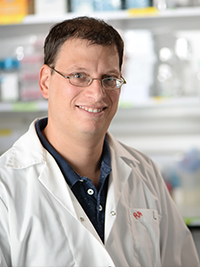 Oren Parnas
Oren ParnasAssistant Professor
Department of Immunology and Cancer Research
The Hebrew University of Jerusalem
Jerusalem, Israel
Exploring the function of regulatory T cell sub-types in pancreatic cancer development and target regulatory T cells to mount an immune response.
2022 Recipients

Alexandra Demcsak, MD, PhD
Postdoctoral Scholar
Department of Surgery
University of California, Los Angeles (UCLA)
Los Angeles, CA
Chymotrypsin deficiency accelerates PDAC development AIM: Early Detection

Evan R. Abt Ph.D.
Postdoctoral Researcher
Molecular and Medical Pharmacology
University of California, Los Angeles (UCLA)
Los Angeles, CA
Identification of actionable immuno-metabolic vulnerabilities of pancreas cancer tumors elicited by mutant-selective KRAS inhibitors AIM: Therapy

Jason Link, Ph.D.
Associate Adjunct Professor
Department of Surgery, Surgical Oncology
University of California, Los Angeles (UCLA)
Los Angeles, CA
The Nature of Effective Tertiary Lymph Structures from Long-Term Surviving Patients with Metastatic PDAC, and the Mechanisms by Which Most PDAC Tumors Circumvent Them
AIM: Therapy

Kamini Singh Ph.D.
Assistant Professor
Molecular Pharmacology
Albert Einstein College of Medicine
Bronx, NY
Finding Neo-Antigens in Pancreatic Cancer: A Translational Approach to Improve Immunotherapy AIM: Immunotherapy

Michael Feigin, Ph.D.
Assistant Professor
Pharmacology and Therapeutics
Roswell Park Comprehensive Cancer Center
Buffalo, NY
Alternative Polyadenylation Drives Phenotypic Plasticity in Cancer Associated Fibroblasts AIM: Cancer Biology

Mirunalini Ravichandran, Ph.D.
Postdoctoral Scholar
Department of Anatomy
University of California, San Francisco
San Francisco, CA
Targeting iron dependency to overcome therapy resistance in pancreatic cancer
AIM: Therapy

Simon Schwörer, Ph.D.
Assistant Professor
Department of Medicine, Hematology/Oncology Division
University of Chicago
Chicago, IL
Elucidating the role of hypoxia in regulating fibroblast heterogeneity in pancreatic cancer AIM: Therapy

Vanaja Konduri, Ph.D.
Assistant Professor
Pathology & Immunology
Baylor College of Medicine
Houston, TX
Cytotoxic effector memory CAR-T cells in conjunction with cholecystokinin receptor antagonist combination immunotherapy for PDAC
AIM: Therapy
2021 Recipients

Ethan V. Abel, Ph.D.
Assistant Professor
Molecular and Cellular Biology
Roswell Park Comprehensive Cancer Center
Buffalo, NY
Deciphering the role of the HNF1A-SKP2 axis in therapeutic response in pancreatic ductal adenocarcinoma
AIM: Therapy

Igor Astsaturov, M.D., Ph.D.
Associate Professor
Molecular Therapeutics
The Research Institute of Fox Chase Cancer Center
Philadelphia, PA
SCAP Regulation of Pancreatic Acinar Cell Differentiation
AIM: Molecular Therapeutics

Jonathan Brody, Ph.D.
Research Professor
Surgery
Oregon Health & Science University
Portland, OR
Development of an international BRCA-PANC Consortium: a bench to bedside to bench initiative
AIM: Diagnosis

Keisuke S. Iwamoto, Ph.D.
Professor
Department of Radiation Oncology
University of California, Los Angeles (UCLA)
Los Angeles, CA
Using a weak electromagnetic field to improve radiotherapeutic gain in treating pancreatic cancer
AIM: Therapy

Nancy Klauber-DeMore, MD
Professor of Surgery
Surgery
Medical University of South Carolina
Charleston, SC
Evaluation of Novel Targeted Therapy to Secreted Frizzled Related Protein 2 in Pancreatic Cancer
AIM: : Therapy

Tobiloba Oni, PhD
Research Fellow
Whitehead Institute for Biomedical Research
Cambridge, MA
Interrogating the Tumor Cell Surfaceome of Pancreatic Cancer Subtypes
AIM: Diagnosis
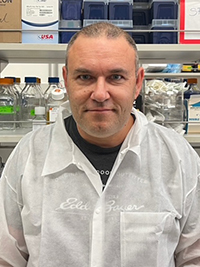
Yaroslav Teper, PhD
Assistant Project Scientist
General Surgery
University of California, Los Angeles (UCLA)
Los Angeles, CA
Comparison of acinar and ductal cell driven PDAC development promoted by obesity
AIM: Biology

Alexandros Tzatsos, MD, PhD
Associate Professor
Anatomy and Cell Biology
The George Washington University
Washington, DC
Understanding the role of defective DNA damage response in chronic inflammation and pancreatic cancer
AIM: Therapy
2020 Recipients
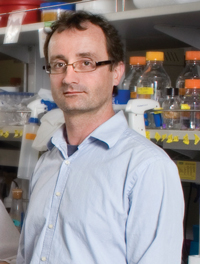 Guido Eibl, MD
Guido Eibl, MDProfessor, Director, Hirshberg Laboratory for Pancreatic Cancer Research
University of California, Los Angeles
 Zsanett Jancso, PhD
Zsanett Jancso, PhDAssistant Project Scientist
Pancreatic ductal adenocarcinoma (PDAC) is a devastating disease with very few treatment options and essentially no cure. Inflammatory conditions of the pancreas (e.g. chronic pancreatitis) as well as environmental factors (smoking, diet) are known to increase the risk of pancreatic cancer, providing opportunity for preventive or interceptive strategies.
It is well established that activating Kras mutations play a necessary role in pancreatic cancer initiation and tumor growth. Further mutations of suppressor genes contribute to accelerating disease development. In sharp contrast, environmental factors that promote tumor development, including the role of chronic pancreatitis, are much less explored and understood.
Hereditary pancreatitis is an early-onset form of chronic pancreatitis caused by mutations in the digestive proteases (enzymes that break down proteins). Carboxypeptidase A1 (CPA1) variants that lead to impaired protein secretion and endoplasmic reticulum (ER) stress are highly overrepresented in pediatric cases of chronic pancreatitis. These mutations of the human CPA1 cause autosomal dominant hereditary chronic pancreatitis, and as risk factors, can contribute to pancreatic cancer susceptibility.
In this proposal we will investigate whether hereditary pancreatitis accelerates pancreatic cancer development. We will use a model with pancreas-specific oncogenic Kras and a loss-of-function mutation in CPA1, which results in protein misfolding and causes chronic pancreatitis via an ER stress related mechanism. Through creating early-onset pancreatitis, we will be able to gain a deeper understanding of how inflammation promotes tumor growth. The study will offer critical insight into how hereditary-pancreatitis associated pancreatic cancer develops and how chronic inflammation promotes tumor growth in the pancreas.
2019 Recipients

Brian Boone, MD
Assistant Professor
West Virginia University
Targeting Peptidyl Arginine Deiminase 4 (PAD4) Induced Neutrophil Extracellular Trap (NET) Formation to Enhance T cell Response in Pancreatic Adenocarcinoma
AIM: Basic Science / Cancer Biology

Luisa F Escobar-Hoyos, MSc, PhD
Research Scholar (Senior Post-Doc)
Memorial Sloan Kettering Cancer Center
Targeting a novel mutant p53-Kras cooperation mechanism in pancreatic cancer
AIM: Cancer Therapy
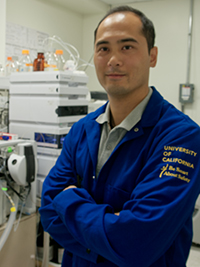
Thuc Le PhD
Project Scientist
University of California, Los Angeles
Mapping and Targeting Nucleotide Biosynthetic Plasticity in Mutant KRAS Driven Pancreatic Cancer
AIM: Basic Science / Cancer Biology

Gina L. Razidlo, PhD
Associate Consultant
Mayo Clinic College of Medicine
Lipid droplets as a fuel for pancreatic cancer metastasis
AIM: Basic Science / Cancer Biology

Steven R. Van Doren, PhD
Professor
University of Missouri
Early-Stage Drug Discovery Targeting a Marker of Pancreatic Cancer and its Metastasis
AIM: Basic Science / Cancer Biology

Erina Vlashi
Associate Professor
University of California, Los Angeles
Potentiating radiation therapy in pancreatic cancer
AIM: Basic Science / Cancer Biology

Wei Wang, MD
Postdoctoral Research Fellow
NYU School of Medicine
Targeting microbiome to enable efficacy for immunotherapy in PDA
AIM: Cancer Therapy
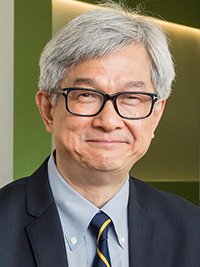
David T. W. Wong, DMD, DMSc
Distinguished Professor & Director, COHNOR
University of California, Los Angeles
Novel KRAS ctDNA for Liquid Biopsy Detection of Pancreatic Cancer
AIM: Diagnosis
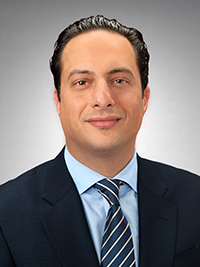
Amer H Zureikat, MD, FACS
Associate Professor of Surgery
University of Pittsburgh Medical Center
Neoadjuvant Autophagy Inhibition in Pancreatic Adenocarcinoma Promotes an Effector T Cell Response and Tertiary Lymphoid Structures
AIM: Basic Science / Cancer Immunology
2018 Recipients

Hui-Hua Chang
Postdoctoral Scholar
University of California, Los Angeles
The roles of free fatty acid receptors (FFARs) and YAP in obesity-promoted pancreatic cancer
AIM: Basic Science
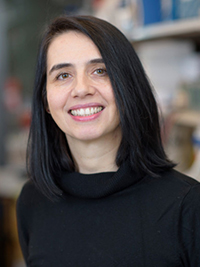
Sylvie Deborde, PhD
Assistant Attending Biologist
Memorial Sloan Kettering Cancer Center
Retinoic acid in Schwann cells involved in pancreatic cancer invasion
AIM: Basic Science

Kathleen E. DelGiorno, PhD
Postdoctoral Research Associate
The Salk Institute for Biological Studies
Tuft cell-derived prostaglandins inhibit pancreatic tumorigenesis
AIM: Therapy

Henry N. Higgs, PhD
Professor
Geisel School of Medicine at Dartmouth
PDAC cell-cell communication through membrane tubes: effects on cell survival and tumor progression
AIM: Basic Science
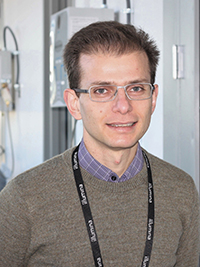
Alexandros Tzatsos, MD, PhD
Assistant Professor
George Washington University Cancer Center
Targeted therapies for squamous-like pancreatic cancer
AIM: Basic Science

David T W Wong, DMD, DMSc
Distinguished Professor & Director, COHNOR
University of California, Los Angeles
Single molecule studies of extracellular vesicles: A quantitative approach for identifying signatures of pancreatic cancer
AIM: Early Detection
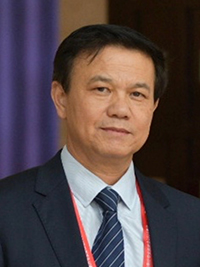
Gary Xiao, PhD
School of Pharmaceutical Science and Technology
Dallian Univerisity of Technology
Dallian, China
Clinical validation of a panel of miRNAs as effective biomarkers for early detection of pancreatic cancer
AIM: Early Detection

Shili Xu, PhD
Associate Project Scientist
Surgery/Division of Surgical Oncology
University of California, Los Angeles
A Precision Combination Therapy for Pancreatic Tumors with Interferon Signaling
AIM: Therapy
2017 Recipients

Wantong Yao, MD, PhD
Instructor
MD Anderson Cancer Center University of Texas
Role of Kras dependent guanine-nucleotide exchange factor in nutrient salvage pathway of pancreatic cancer

Mara Sherman, PhD
Assistant Professor
Oregon Health & Science University
Elucidating the Metabolic Functions of the Pancreatic Tumor Microenvironment

Nelson S. Yee, MD, PhD
Assistant Professor
The Pennsylvania State University, College of Medicine
Extracellular Vesicles as Biomarkers for Early Detection of Recurrent Pancreatic Ductal Adenocarcinoma

Walid Shaib, MD
Assistant Professor
Emory University
Effect of Treatment on Immune Pathways in Pancreatic Adenocarcinoma: A Comparative Tissue Study

Howard E. Katz, PhD
Professor
Johns Hopkins University
Metabolomic-enhanced Specificity for Glycoprotein Pancreatic Cancer Biomarkers

Tijana Jovanovic-Talisman, PhD
Assistant Professor
Beckman Research Institute, City of Hope
Single molecule studies of extracellular vesicles: A quantitative approach for identifying signatures of pancreatic cancer
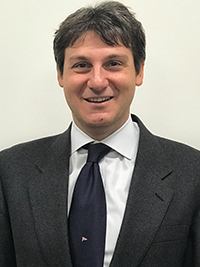
Matteo Ligorio, MD, PhD
Fellow
The General Hospital Corporation dba Massachusetts General Hospital
Discovering Novel Therapeutic Strategies for Patients with Pancreatic Cancer

Lynn Doering, RN, PhD, FAAN
Associate Dean, Academic and Student Affairs, Professor
School of Nursing, University of California, Los Angeles
Test feasibility and accessibility of internet-based cognitive behavioral therapy led by oncology nurses and including education and coaching (iCBT-PLUS) for PC patient/caregiver dyads.
2016 Recipients

Annette L. Stanton, PhD
Professor
University of California, Los Angeles
“Living with Pancreatic Cancer: Psychological, Social, and Health-related Experiences of Patients and Partners”

Jonathan C. King, MD
Assistant Professor of Surgery
University of California, Los Angeles
“The Peritoneal Pre-Metastic Niche in Pancreatic Cancer”

Zhaoping Li, MD, PhD
Professor
University of California, Los Angeles
“Nutrition Support to improve outcomes in patients with unresectable pancreatic cancer”

Mark Girgis, MD
Assistant Professor of Surgery
University of California, Los Angeles
“Targeting Pancreas Cancer with Novel Peptides to Cancer Associated Fibroblasts”

Nada Kalaany, PhD
Assistant Professor
Harvard Medical School
Associate in Medicine
Boston Children’s Hospital
“Targeting the urea cycle in obesity-associated pancreatic cancer”

Pingping Hou, PhD
Postdoctoral Fellow
University of Texas
MD Anderson Cancer Center
“Identification of USP21 as a novel oncogene to drive Kras*-extinction resistance in pancreatic cancer”

Audrey M. Hendley, PhD
Postdoctoral Scholar
University of California, San Francisco
“Understanding sphingolipid metabolism in pancreatic cancer initiation, progression, and chemotherapeutics”

Haoqiang Ying, MD, PhD
Assistant Professor
University of Texas
MD Anderson Cancer Center
“The role of TEAD transcription factors in the maintenance of KRAS-independent tumor cells in pancreatic ”

Ling Huang, PhD
Research Fellow
Beth Israel Deaconess Medical Center
“Using tumor organoids to investigate EZH2 targeting for pancreatic cancer treatment”

Jami L. Saloman, PhD
Postdoctoral Associate
University of Pittsburgh
“Neural regulation of pancreatic cancer”

Lawrence Gardner, MD
Associate Professor
New York University School of Medicine
“Exploiting Nonsense Mediated RNA decay inhibition in Pancreatic Cancer”
2015 Recipients

Stergios Katsiougiannis, PhD
Assistant Project Scientist
University of California, Los Angeles
“Immunosuppressive effects of salivary exosomes in pancreatic cancer”
AIM: Basic Science

Zhao Li, PhD
Post Doctoral Research Associate & Lecturer
University of California, Los Angeles
“Early Pancreatic Cancer Imaging by CA19-9 Magnetic Nanoparticles and Active-Feedback Magnetic Resonance”
AIM: Diagnosis

Huan Meng, PhD
Assistant Professor
University of California, Los Angeles
“Targeted delivery of irinotecan by the combined use of a transcytosis-inducing iRGD peptide and mesoporous silica nanoparticle for pancreatic cancer treatment”
AIM: Therapy
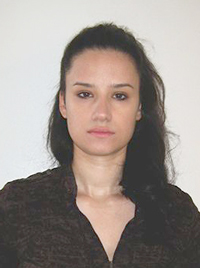
Alice Soragni, PhD
Post Doctoral Researcher
University of California, Los Angeles
“Targeting p53 aggregation to treat PDAC”
AIM: Therapy

Ken Herrmann, MD MBA
Associate Professor
University of California, Los Angeles
“Clinical translation of the somatostatin receptor 2 theranostic concept at UCLA”
AIM: Diagnosis and Therapy

Rushika M Perera, PhD
Assistant Professor
University of California, San Francisco
“Function of nutrient scavenging pathways in pancreatic cancer metabolism”
AIM: Basic Science

Marina Pasca Di Magliano, PhDAssociate Professor of Surgery
University of Michigan
“Understanding the requirement for Mutant P53 in Pancreatic Cancer progression and metastasis”
AIM: Basic Science

Marilyn D Resh, PhD
Professor
Memorial Sloan Kettering Cancer Center
“Pancreatic Cancer Stem Cells and Organoids as models to test Hedgehog acyltransferase inhibitors in pancreatic cancer”
AIM: Basic Sience and Therapy

Filippos Kottakis, PhD
Assistant in Genetics
Massachusetts General Hospital (MGH)
“Targeting Defective Nutrient Sensing in Pancreatic Cancer”
AIM: Therapy

George Miller, MD
Associate Professor
New York University School of Medicine
“T Cell Mediated Immune Suppression in Pancreatic Oncogenesis”
AIM: Basic Science and Therapy

Gary Guishan Xiao, PhD
Professor of Pharmacology
School of Pharmaceutical Science and Technology at Dalian University of Technology China
“Metabolic and proteomic mechanisms of microRNA (miR-34a) regulation of stemness in pancreatic cancer and its chemoresistance”
AIM: Basic Science and Therapy
2014 Recipients

Jonathan R. Brody, PhD
John Pascal, PhD
Associate Professors
Thomas Jefferson University
“Selective targeting of PARP-1 and PARP inhibitor- resistance for the treatment of pancreatic cancer”
AIM: Therapy

Yiannis Drosos, PhD
Postdoctoral Fellow
St. Jude Children’s Research Hospital
“Targeting ATM mediated DNA damage response as a potential therapy in pancreatic cancer”
AIM: Therapy

Timothy L. Frankel, MD
Assistant Professor of Surgery
University of Michigan
“Immunomodulatory effects of tumor-derived exosomes in pancreas cancer”
AIM: Therapy

William Gelbart, PhD
Distinguished Professor of Chemistry and Biochemistry
University of California, Los Angeles
“Armored” Self-Replicating Genes as Delivery Systems for Early Pancreatic Cancer Detection by Magnetic Resonance Molecular Imaging”
AIM: Early Detection
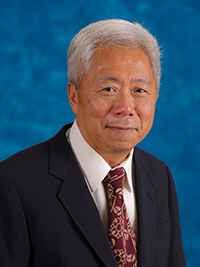
Paul Lee
Professor of Pediatrics
LA Biomedical Research Institute at Harbor-UCLA Medical Center
“Metabolic Profile of Gemcitabine Resistance in pancreatic cancer”
AIM: Therapy

She-Hi Liu
Adjunct Assistant Professor
University of California, Los Angeles
“Development a Potent Synthetic Reporter System for Earlier Detection, Accurate Quantification and Precise Localization of Pancreatic Cancer”
AIM: Early Detection

Qing-Yi Lu, PhD
Adjunct Professor
University of California, Los Angeles
“A pilot study on the anti-hyperglycemic and anti-tumor effects of loquat leaf extract”
AIM: Prevention

Rushika Perera, PhD
Instructor in Medicine
Massachusetts General Hospital and Harvard Medical School
“MiT/TFE transcription factors are required for metabolic reprogramming in pancreatic cancer”
AIM: Therapy

Heloisa Soares, MD
Resident Physician
University of California, Los Angeles
“Cross talk between PI3K/mTOR and MEK/ERK”
AIM: Prevention and Therapy

Narendra Wajapeyee, PhD
Assistant Professor
Department of Pathology and Yale Cancer Center
Yale University
“Identifying the drivers of pancreatic cancer initiation and progression”
AIM: Prevention
2012 Recipients

Alexandros Tzatsos, M.D., PhD
Instructor in Medicine
Massachusetts General Hospital-Cancer Center
“Validation of the histone demethylase KDM2B as a new therapeutic target in pancreatic cancer.”

Anne Coscarelli, PhD
Clinical Professor of Psychology
University of California Los Angeles
“Providing optimal psychosocial support to patients and families through the journey of pancreatic cancer.”

Ido Wolf, MD
Senior Lecturer, Tel Aviv University
Tel Aviv Sourasky Medical Center (Oncology Department)
“The hormone klotho: a novel regulator of the ERK1/2 cascade in pancreatic adenocarcinoma.”
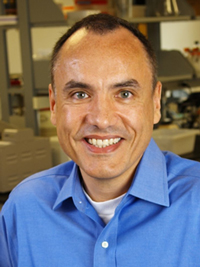
Isidore Rigoutsos, PhD
Director, Computational Medicine Center
Thomas Jefferson University
“New Vistas for Gene Regulation in Pancreatic Cancer.”

Mouad Edderkaoui, PhD
Research Scientist
Brentwood Biomedical Research Institute
“Targeting EMT pathway as a promising strategy for pancreatic cancer treatment”

Parkash Gill, MD
Professor of Medicine and Pathology
University of Southern California (Hematology Department)
“Role of EphB4 in Kras Mutant PDAC.”

Qing- Yi Lu, MD, PhD
Associate Professor & Core Director
University of California, Los Angeles
“The Phytonutrient Core of the UCLA Center for Excellence in Pancreatic Diseases”
2011 Recipients

Pamela Itkin-Ansari, PhD
Department of Pediatrics
University of California, San Diego
“Restoring balance to the bHLH/Id3 Axis as a potential therapy for pancreatic cancer.”

Andrea Bullock, MD
Internal Medicine/Hematology-Oncology
Beth Israel Deaconess Medical Center; Harvard Medical School
“Mitogenic signaling after loss of tumor suppressor genes BRCA1 or BRCA2 in pancreatic cancer.”

Stephan D. Kendall, MD
Medicine/Medical Oncology
Duke University Medical Center
“Using genetically-engineered mouse models to evaluate the role of macrophages in pancreatic tumorigenesis.”

David Gius, MD, PhD
Cancer Biology/Radiation Oncology
Vanderbilt Medical School
“Sirt2 regulation of KRAS is an early event in pancreas carcinogenesis.”

Emmanuelle Meuillet, PhD
Nutritional Sciences and Molecular and Cellular Biology
The University of Arizona Cancer Center
“Mechanistic and translational studies of the inflammatory response in pancreatic cancer.”

Yung-Ya Lin, PhD
Department of Chemistry and Biochemistry
University of California, Los Angeles
“An integrated synergistic approach for early detection and targeted therapy of pancreatic cancers by magnetic resonance molecular imaging and nano medicine.”
2010 Recipients
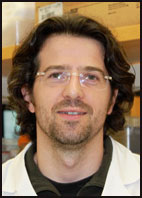
Andrea Viale, MD
Department of Medical Oncology
Dana Farber Cancer Institute, Boston, MA
“The role of oncogenic K-RAS in self–renewal and maintenance of cancer stem cells in pancreatic cancer.”

Ying Ma, PhD
Department of Immunology
University of Texas, MD Anderson Cancer Center, Houston, TX
“Mast cell blockage as immunotherapy for pancreatic cancer.”

Larry Karnitz, PhD
Department of Radiation Oncology
Mayo Clinic, Rochester, MN
“An innovative drug combination for pancreatic cancer.”

Guido Eibl, MD
Department of Surgery
University of California, Los Angeles, CA
“Western diet-induced pancreatic cancer.”
2009 Recipients
Pathology
University of Pittsburgh
Hillman Cancer Center
“Combinatorial Strategy for Targeting Pancreatic Cancer Stem Cells.”
Molecular Pharmacology & Chemistry and Medicine
Memorial-Sloan Kettering Cancer Center
“Inhibition of Molecular Chaperones as a Potential Therapy for Pancreatic Cancer.”
School of Dentistry & Jonsson Comprehensive Cancer Center UCLA
“Tracer-Based Proteomics of Pancreatic Cancer.”
Surgery/General Surgery
University of California, Los Angeles, CA
“Identifying the Malignant Signatures Associated with the Development of Human Pancreatic Cancer.“
2008 Recipients
Medical Oncology
Fox Chase Cancer Center
“Tumor Stromal Fibroblasts as a Therapeutic Target”
Pediatrics LABiomedical Research Institute
Harbor-UCLA Medical Center
“Proteomics of Pancreatic Cancer: Determination of Protein Turnover”
Medicine/BBRI
VA, Greater Los Angeles Healthcare System
“Stress and Pancreatic Cancer: Role of Corticotropin Releasing Factor (CRF) System”
2007 Recipients
Department of Surgery
Division of Basic & Translational Research
University of Minnesota
“The Inhibition of HSP70 Expression Sensitizes Pancreatic Cancer Cells to TRAIL-Induced Apoptotic Cell Death”
Gastroenterology and Oncology
Mayo Clinic and Mayo College of Medicine
“BH3 Mimetic Reverses Apoptosis Resistance in Human Pancreatic Cancer Cells”
Division of Endocrinology, Diabetes & Metabolism
University of California, Los Angeles
“Glucagon-Like Peptide-1 is a Promissing Anti-Pancreatic Cancer Stem Cell Agent by Cell-Differentiation Induction and Growth Inhibition”
Division of Hematology-Oncology
University of California, Los Angeles
“Clinical Trial of Gemcitabine with Genistein or Placebo After Resection for Pancreatic Adenocarcinoma”
Co-Director, UCLA Pancreatic Tissue Bank
Department of Pathology and Laboratory Medicine
David Geffen School of Medicine at UCLA
UCLA Pancreatic Tissue Bank and Data System
2006 Recipients
Division of Digestive and Liver Diseases
Columbia University
“Pancreatic Physiology in the Screening and Early Detection of Human Pancreatic Adenocarcinoma”
Center for Human Nutrition
University of California, Los Angeles
“Fatty Acid Synthase Inhibitors in Pancreatic Cancer”
Department of General and Oncology Surgery
Division of Clinical and Molecular Pharmacology
City of Hope National Medical Center and Beckman Research Institute
“Targeting Chemokine Receptor CXCR4 to Prevent Pancreatic Cancer”
Division of Digestive Diseases
University of California, Los Angeles
“Role of Protein Kinase D (PKD) in the Proliferation of Pancreatic Cancer Cells”
Department of Surgery
Cameron Division of Surgical Oncology
Johns Hopkins University
“Targeting Lipid Mediations of Pancreatic Cancer Growth”
2005 Recipients
Department of Biochemistry and Microbiology
Center for Molecular Biology & Gene Therapy
Loma Linda University
“Surviving Regulation of Apoptosis in Pancreatic Cancer”
UCLA / VA Greater LA Healthcare System
“Sensitization of Pancreatic Cancer to Gemcitabine Chemotherapy by Inhibiting Anti-Apoptotic XIAP with Herb-Derived Embelin”
Professor & Chief
Division of Gastrointestinal Surgery
David Geffen School of Medicine at UCLA
Continuing funding for Hirshberg Translational Pancreatic Cancer Research Laboratory at UCLA
Med-VA Greater LA Healthcare System
(Fellowship Support for Dr. Izumi Ohno )
“Regulation of DNA Synthesis Pathways by Reactive Oxygen Species in Pancreatic Cancer”
Department of Pathology and Laboratory Medicine
David Geffen School of Medicine at UCLA
Funding for the UCLA Pancreatic Tissue Bank